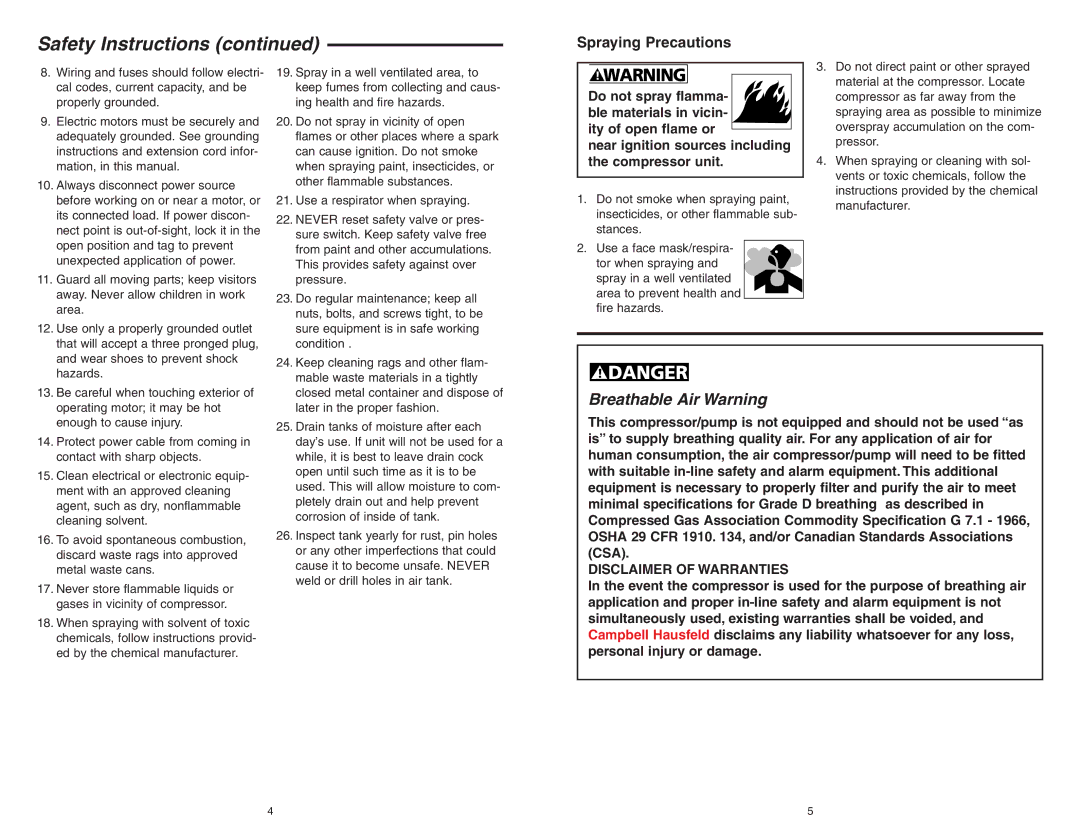
Safety Instructions (continued)
Spraying Precautions
8.Wiring and fuses should follow electri- cal codes, current capacity, and be properly grounded.
9.Electric motors must be securely and adequately grounded. See grounding instructions and extension cord infor- mation, in this manual.
10. Always disconnect power source |
before working on or near a motor, or |
its connected load. If power discon- |
nect point is |
open position and tag to prevent |
unexpected application of power. |
11. Guard all moving parts; keep visitors |
away. Never allow children in work |
area. |
12. Use only a properly grounded outlet |
that will accept a three pronged plug, |
and wear shoes to prevent shock |
19. Spray in a well ventilated area, to |
keep fumes from collecting and caus- |
ing health and fire hazards. |
20. Do not spray in vicinity of open |
flames or other places where a spark |
can cause ignition. Do not smoke |
when spraying paint, insecticides, or |
other flammable substances. |
21. Use a respirator when spraying. |
22. NEVER reset safety valve or pres- |
sure switch. Keep safety valve free |
from paint and other accumulations. |
This provides safety against over |
pressure. |
23. Do regular maintenance; keep all |
nuts, bolts, and screws tight, to be |
sure equipment is in safe working |
condition . |
24. Keep cleaning rags and other flam- |
!WARNING
Do not spray flamma- ble materials in vicin- ity of open flame or
near ignition sources including the compressor unit.
1.Do not smoke when spraying paint, insecticides, or other flammable sub- stances.
2. Use a face mask/respira- tor when spraying and spray in a well ventilated area to prevent health and fire hazards.
3.Do not direct paint or other sprayed material at the compressor. Locate compressor as far away from the spraying area as possible to minimize overspray accumulation on the com- pressor.
4.When spraying or cleaning with sol- vents or toxic chemicals, follow the instructions provided by the chemical manufacturer.
hazards. |
13. Be careful when touching exterior of |
operating motor; it may be hot |
enough to cause injury. |
14. Protect power cable from coming in |
contact with sharp objects. |
15. Clean electrical or electronic equip- |
ment with an approved cleaning |
agent, such as dry, nonflammable |
cleaning solvent. |
16. To avoid spontaneous combustion, |
discard waste rags into approved |
metal waste cans. |
17. Never store flammable liquids or |
gases in vicinity of compressor. |
18. When spraying with solvent of toxic |
chemicals, follow instructions provid- |
ed by the chemical manufacturer. |
mable waste materials in a tightly |
closed metal container and dispose of |
later in the proper fashion. |
25. Drain tanks of moisture after each |
day’s use. If unit will not be used for a |
while, it is best to leave drain cock |
open until such time as it is to be |
used. This will allow moisture to com- |
pletely drain out and help prevent |
corrosion of inside of tank. |
26. Inspect tank yearly for rust, pin holes |
or any other imperfections that could |
cause it to become unsafe. NEVER |
weld or drill holes in air tank. |
!DANGER
Breathable Air Warning
This compressor/pump is not equipped and should not be used “as is” to supply breathing quality air. For any application of air for human consumption, the air compressor/pump will need to be fitted with suitable
DISCLAIMER OF WARRANTIES
In the event the compressor is used for the purpose of breathing air application and proper
4 | 5 |
